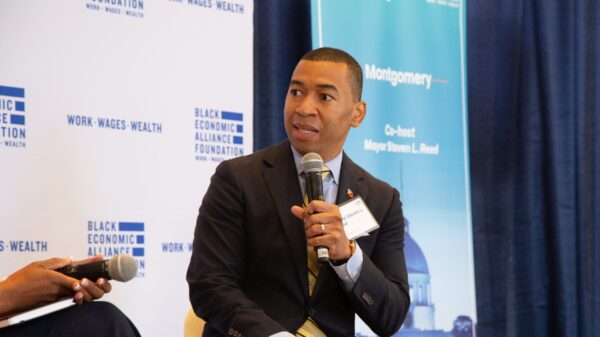When the leadership team behind Montgomery charter school LEAD Academy began putting together an application to start a school, the members knew they lacked experience. None of them had opened a charter or had experience running a school. So, they made the unique decision to turn the management of their school over to a Charter Management Organization.
Acting as a sort of central office, the CMO takes care of the daily details of running a charter school. For this hefty task, LEAD chose Unity School Services, a newly-formed group headed by Soner Tarim, the since-retired founder of Harmony Schools — a massive charter school chain that began in Texas.
But here’s where things get dicey. And where even more questions surface about the approval process that allowed LEAD to open.
Tarim is a divisive figure in the world of charter schools, and his Harmony Schools has been used as both a model of excellence and a cautionary tale for how awry things can go when you start mixing public money and private businesses.
In most of the reporting on LEAD, Tarim’s name rarely appears. In the few instances in which it does, it is usually a brief mention about Unity’s CMO role, and Tarim is ID’d as the founder of Harmony Schools.
It wasn’t until a few weeks ago that I became aware of Tarim’s … troubling — although that might be too strong — past and the even more troubling — and that’s maybe not strong enough — dealings of the Harmony School and the Gulen movement.
But a simple Internet search turned up a series of news reports and allegations that span from Facebook meme-level crazy to just really awful.
Among other things, Tarim’s schools have been accused of being a financial front for a religious movement centered around the teachings of a controversial Turkish preacher named Fethullah Gulen, who pushes a more moderate brand of Islam. The Gulen Network of schools, which now includes dozens of schools all around the country, were all started by followers of Gulen, who resides now in Pennsylvania, where he remains a thorn in the side of the Turkish government.
Gulen is viewed as a radical by the Turkish government, which labeled his movement a terrorist organization. In 2016, fearing Gulen’s growing influence, Turkey hired a law firm to investigate Harmony Schools. The results, reported by the Dallas Morning News, alleged findings of discrimination, fraud, misspent funds and improper ties to Gulen.
Tarim called the allegation “ridiculous,” and said many of the findings had already been addressed or dismissed.
But those are far from Harmony’s and the Gulen Network’s only problems.
An investigation by the New York Times in 2011 found that Harmony was abusing work visas and stacking Harmony’s faculty with Turkish residents. It also found that Harmony was skirting public laws and spending public money to hire primarily Turkish contractors and workers.
Investigations of Harmony schools in Texas and Gulen schools in Ohio and Minnesota found evidence of misused federal grant money, falsifying standards and test scores, grade changing and questionable hiring practices.
Tarim and other Gulen officials have denied many of the allegations, and the Texas Education Agency cleared Harmony of most alleged wrongdoing in that state. However, numerous other allegations remain because Texas, at one point, had just nine people overseeing more than 500 charter schools in the state. (Texas charter school officials still believe in Tarim, going so far as to name him Leader of the Year in 2017.)
But the most consistent and damaging allegations revolve around Harmony’s ties to Gulen, and the hiring practices of the schools.
The NYT story in 2011 examined spending records and public data after being told by Tarim that the schools follow all bid laws and that they don’t play favorites with contracts. The Times’ investigation found that virtually all of the contracts awarded by Harmony had gone to Turkish-owned companies, and local contractors told the newspaper that they lost out on jobs even after being the lowest bidder.
Another investigation by Reuters in 2016 found that the Harmony schools were struggling financially, and noted that the Gulen schools in more than a dozen states were under investigation for crimes ranging from misuse of public funds to visa fraud.
An investigation by a Houston TV station in 2012 at Texas’ Harmony schools found multiple instances of grade changing by school faculty. And more allegations surfaced in 2015 of Harmony schools altering grades and test scores to increase achievement numbers. (The 2015 allegations were never substantiated.)
The schools’ ties to Gulen and its questionable practices also led to school officials in some states and cities to deny Gulen schools’ applications. In Memphis, for example, officials refused to approve a Gulen-backed charter school, and officials there cited its Gulen ties.
In Alabama, it’s unclear just how much work was done to determine Tarim’s role in problems at Harmony or his ties to Gulen, and whether any of that should deter LEAD’s approval. But what is clear is that state officials should have known.
A 2018 report from the Center for Public Integrity outlined the growing allegations against Gulen schools and it ID’d lawmakers from numerous states who had taken trips abroad thanks to Gulen-backed charities — trips meant to influence their approval of Gulen charter schools. In Alabama, four lawmakers took the trips, although none of them have ties to the state’s charter school board or to LEAD.
The extent of Alabama’s investigation into Tarim’s newly-formed Unity Schools company that is managing Montgomery’s first charter school appears to be a single phone call to Texas charter officials.
That call came from Logan Searcy, the Alabama State Department of Education’s liaison with charter schools. Searcy said she spoke with Heather Mauze, the director of the Texas Charter School Administration, who had nothing but praise for Tarim.
“I talked with her and she was very pleased with (Tarim) and we also reviewed their investigation into Harmony,” Searcy said. “That report completely cleared them of wrongdoing. Those were facts after an investigation, not just allegations.”
When I asked about the multiple other issues — those that didn’t arise from a foreign government’s investigation — Searcy said she didn’t personally investigate any of those, but she wasn’t sure what other Alabama Charter School Board members might have done.
If those members looked into Tarim’s background, they didn’t press him on it during LEAD’s application hearing, at which Tarim made a presentation to the board.
Searcy also made a point that Texas’ officials have repeatedly stated — that much of the backlash against Tarim stems from xenophobia related to his religion and the religious beliefs of the Gulen movement. There is evidence to support those claims.
However, there has been no evidence — or even any real allegations — that any of the Gulen schools have pushed religious beliefs of any sort to students.
Under normal circumstances, that might be enough to let it all go and give Tarim and Unity and LEAD the benefit of the doubt. Except, there’s been nothing normal at all about the process that will allow LEAD to open its doors next fall.
LEAD’s application failed to meet any of the standards for approval judged by the authorizers that the state has contracted to review charter applications. In portions, the review of LEAD’s application almost seemed mocking.
That failure was ignored by the Charter School Board, which approved LEAD’s application — but only a minority of the board would agree to the charade. That landed the process in state court, where the Alabama Supreme Court invented a legal definition out of thin air to justify allowing LEAD to open.
All of that sailed through Alabama’s backlogged court system on a rocket, going from circuit court to written ALSC ruling in mere months. Which falls in line with the rest of the process that plowed through any and all problems — no matter how real or troubling — to allow LEAD to open this fall.
And now, into that soup of problems, add one more: The guy who is supposed to be overseeing the operation of this charter school has left a pile of weird, crazy and very troubling issues in his wake. And it didn’t seem as if anyone really cared.



















































